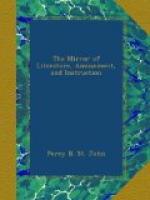April 2nd.—We had scarcely finished our dejeune a la fourchette this day when Lord Byron was announced: he sent up two printed cards, in an envelope addressed to us, and soon followed them. He appeared still more gay and cheerful than the day before—made various inquiries about all our mutual friends in England—spoke of them with affectionate interest, mixed with a badinage in which none of their little defects were spared; indeed candour obliges me to own that their defects seemed to have made a deeper impression on his mind than their good qualities (though he allowed all the latter) by the gusto with which he entered into them.
He talked of our mutual friend Moore, and of his Lalla Rookh, which he said, though very beautiful, had disappointed him, adding, that Moore would go down to posterity by his Melodies, which were all perfect. He said that he had never been so much affected as on hearing Moore sing some of them, particularly “When first I met Thee,” which, he said, made him shed tears: “But,” added he, with a look full of archness, “it was after I had drunk a certain portion of very potent white brandy.” As he laid a peculiar stress on the word affected, I smiled, and the sequel of the white brandy made me smile again: he asked me the cause, and I answered that his observation reminded me of the story of a lady offering her condolence to a poor Irishwoman on the death of her child, who stated that she had never been more affected than on the event; the poor woman, knowing the hollowness of the compliment, answered with all the quickness of her country, “Sure, then, Ma’am, that is saying a great deal, for you were always affected.” Lord Byron laughed, and said my apropos was very wicked—but I maintained it was very just. He spoke much more warmly of Moore’s social attractions as a companion, which he said were unrivalled, than of his merits as a poet.
When Lord Byron came to dine with us on Thursday, he arrived an hour before the usual time, and appeared in good spirits. He said that he found the passages and stairs filled with people, who stared at him very much; but he did not seem vexed at this homage, for so it certainly was meant, as the Albergo della Ville, where we resided, being filled with English, all were curious to see their distinguished countryman. He was very gay at dinner, ate of most of the dishes, expressed pleasure at partaking of a plum pudding, a l’Anglaise, made by one of our English




